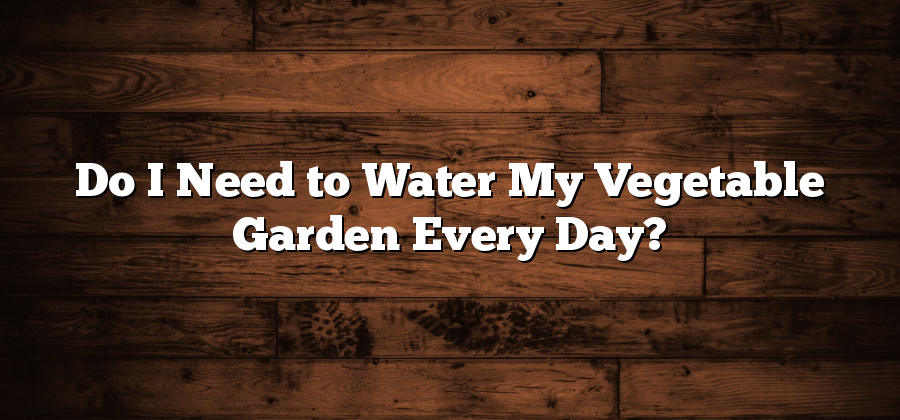How Frequently Should I Water My Vegetable Garden?
One of the most important factors in successfully growing a vegetable garden is providing it with the right amount of water. While there is no one-size-fits-all answer to the question of how frequently you should water your vegetable garden, there are a few guidelines that can help you make an informed decision. Keep in mind that the frequency of watering will depend on various factors such as the type of vegetables you are growing, the weather conditions in your area, and the soil moisture levels.
To start, it’s crucial to understand that overwatering can be just as detrimental to your vegetable garden as underwatering. Watering too frequently can lead to shallow root growth, which makes plants more susceptible to stress and disease. On the other hand, not providing enough water can result in stunted growth, reduced yields, and wilted or dried-out plants. Striking a balance between these extremes is essential for ensuring the health and productivity of your vegetable garden.
Factors to Consider When Watering Your Vegetable Garden
One of the key factors to consider when watering your vegetable garden is the type of soil you have. The texture and composition of your soil can greatly affect its ability to retain water. Sandy soils, for example, drain quickly and may require more frequent watering. On the other hand, clay soils tend to compact easily and become waterlogged, so they may require less frequent irrigation. It is important to understand your soil type and how it interacts with water to ensure you are providing the appropriate amount of moisture to your plants.
Another factor to consider is the specific water needs of the vegetables you are growing. Different vegetables have different water requirements, so it is essential to tailor your watering schedule accordingly. Leafy greens, such as lettuce and spinach, typically have higher water needs and may require more frequent watering. Root vegetables, like carrots and potatoes, generally need less water. Understanding the specific needs of each plant in your vegetable garden will help you make informed decisions about how much and how often to water.
• Consider the type of soil you have, as it greatly affects water retention
• Sandy soils may require more frequent watering due to their quick drainage
• Clay soils can become waterlogged easily and may need less irrigation
• Understand your soil type to provide appropriate moisture to your plants
• Take into account the specific water needs of the vegetables you are growing
• Leafy greens like lettuce and spinach typically require higher amounts of water
• Root vegetables such as carrots and potatoes generally need less watering
• Tailor your watering schedule based on the specific needs of each plant in your garden
Understanding the Water Requirements of Different Vegetables
When it comes to vegetable gardening, it is essential to understand that different vegetables have varying water requirements. Some vegetables thrive in moist soil, while others prefer drier conditions. To ensure the health and productivity of your vegetable garden, it is crucial to water each plant according to its specific needs.
Leafy greens such as lettuce and spinach generally require frequent and consistent watering. These vegetables have shallow root systems and can wilt quickly under hot conditions. On the other hand, root vegetables like carrots and radishes can tolerate drier conditions and require less frequent watering. Understanding the water requirements of different vegetables will help you establish a suitable watering schedule, ensuring each plant receives the optimal amount of moisture for healthy growth.
Signs of Underwatering in a Vegetable Garden
For any avid gardener, understanding the signs of underwatering in a vegetable garden is crucial for the optimal growth and health of your plants. One of the most common indications of underwatering is the wilting of leaves. As water is essential for the transfer of nutrients from the roots to the rest of the plant, a lack of moisture can cause the leaves to droop and become limp. Additionally, if you notice that the soil is dry and cracked, especially closer to the surface, it may be a sign that your vegetable garden is not receiving enough water.
Another sign to watch out for is the appearance of yellow or brown patches on the leaves. When there is insufficient water, plants struggle to retain their vibrant green color, and instead, the leaves may start to discolor or develop dry edges. Keep in mind that not all plants react the same way to insufficient watering, so it is important to familiarize yourself with the specific needs of the vegetables you are growing. By being attentive to these signs, you can address any water deficiency issues promptly and ensure the overall health and productivity of your vegetable garden.
How to Determine if Your Vegetable Garden Needs Watering
One of the most important aspects of maintaining a healthy and thriving vegetable garden is ensuring that it receives an adequate amount of water. However, determining exactly when to water can be a bit tricky. Fortunately, there are several signs that can help you determine if your vegetable garden is in need of watering.
Firstly, take a close look at the soil. Dry, cracked soil is a clear indication that your garden is in need of water. Additionally, if the soil feels dry to the touch several inches below the surface, it is likely that your plants are not receiving enough moisture. Another sign to look out for is wilting leaves. If you notice that the leaves on your vegetable plants are limp or drooping, this may be a sign that they need to be watered. It is important to note that each vegetable has different water requirements, so it is essential to familiarize yourself with the specific needs of the plants in your garden. By paying attention to these signs and understanding the water requirements of your vegetables, you can ensure that your garden stays healthy and productive throughout the growing season.






